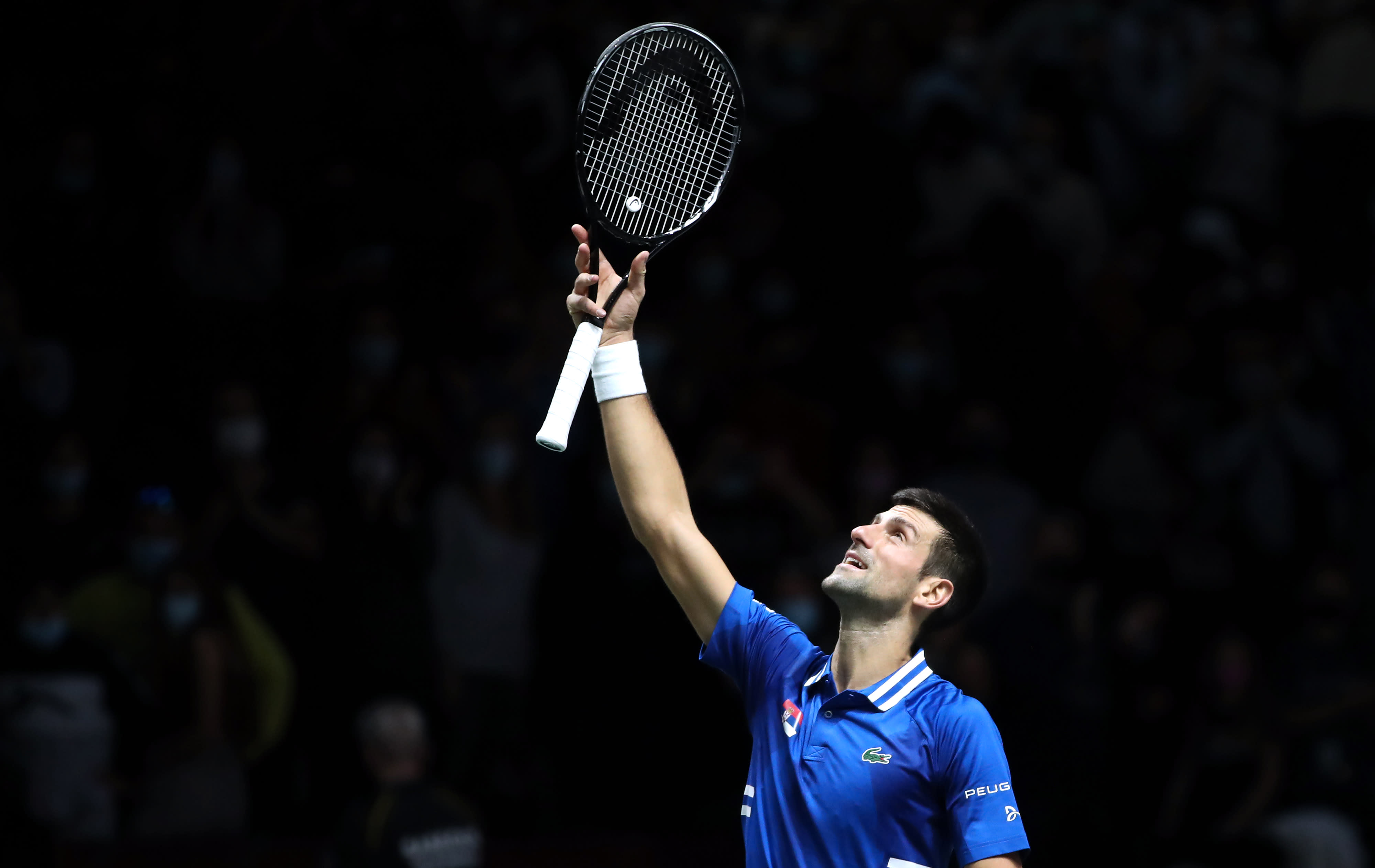Novak Djokovic back on a tennis court after Australian judge revokes visa cancellation

Novak Djokovic of Serbia celebrates winning against Marin Cilic of Croatia in match 2 of the Davis Cup Semi Final at Madrid Arena on December 3, 2021.
Sanjin Strukic | Pixsell | MB Media | Getty Images
Tennis star Novak Djokovic has won his court battle in Australia after his visa was canceled due to his Covid-19 vaccination status ahead of the Australian Open.
Australian Federal Judge Anthony Kelly read out the ruling in an emergency virtual court hearing Monday. “The court will order as follows: Paragraph 1, the decision of the delegate to cancel the applicant’s temporary activity subclass 048 visa made on 6 January 2022, be quashed,” he said.
This means that Djokovic’s visa remains valid. He has been released from detention and will be given back his passport and other belongings confiscated at the time of detention. Within hours of the ruling, he was back on a tennis court.
The tennis star tweeted out his reaction to the decision on Monday evening local time, posting a picture of himself on a Melbourne tennis court with the caption: “I’m pleased and grateful that the Judge overturned my visa cancellation. Despite all that has happened, I want to stay and try to compete @AustralianOpen I remain focused on that. I flew here to play at one of the most important events we have in front of the amazing fans.”
Djokovic fans who had gathered outside the hotel where the world tennis champion was detained burst into cheers and patriotic Serbian songs when the news was announced.
Scenes outside Djokovic’s hotel became chaotic when some fans had skirmishes with police, who deployed pepper spray to disperse them after they surrounded a car that they mistakenly believed the tennis star was riding in. Videos on social media showed sidewalks covered in milk, which bystanders had apparently bought at nearby shops to help rinse the stinging chemical from their eyes. Children and reporters were among those hit with the pepper spray, according to local media on the ground.
The 34-year-old Serbian national was detained in an immigration facility last week after arriving in Melbourne ahead of the Australian Open for what officials said violated the country’s strict entry rules that require visitors be vaccinated against Covid.
Djokovic, a vocal vaccine skeptic aiming for a record-breaking 21st Grand Slam title, had his visa revoked and passport confiscated after customs officials decided he did not have sufficient medical justification for a vaccine exemption.
Supporters of Serbian tennis player Novak Djokovic rally outside the Park Hotel, where the star athlete is believed to be held while he stays in Australia, in Melbourne, Australia, January 6, 2022.
Loren Elliott | Reuters
Judge Kelly made points in Djokovic’s defense Monday, demanding to know what more the athlete could have done to meet Australia’s entry requirements. The government on Monday acknowledged that it did not give Djokovic and his team sufficient time to react after informing him of his visa cancellation.
But the saga is not over — Australia’s immigration minister can still personally step in and cancel his visa regardless on new grounds. If the minister, Alex Hawke, decides to take that action, Djokovic could be facing a renewed court fight and potentially up to a three-year ban on playing tennis in Australia.
A spokesman for Hawke said Monday that “it remains within immigration minister Hawke’s discretion to consider cancelling Mr Djokovic’s visa under his personal power of cancellation within section 133C(3) of the Migration Act. The minister is currently considering the matter and the process remains ongoing.”
Djokovic’s team of lawyers argued in a court filing Saturday that the tennis player’s contraction of Covid-19 — for which he tested positive on Dec. 16 — served as a sufficient vaccine exemption. But controversy followed when observers pointed out photos taken on Dec. 17 with Djokovic and several Serbian youth tennis players, unmasked and indoors. It is not clear whether Djokovic or his team knew he was positive for the virus at that time.
A medical exemption provided by a doctor was in Djokovic’s visa application, and was previously supported by an independent panel assigned by the Australian state government of Victoria.
Judge Kelly pointed to what was apparently a procedural error by Australian authorities: They told Djokovic he would be able to speak and deliberate with his team and Tennis Australia before any action was taken on the visa, but then canceled it and detained him anyway, before he and his team had time to convene.
“The point I’m somewhat agitated about is, what more could this man have done?” Kelly said.
The story has inflamed debate around vaccine requirements and put a spotlight on Australia’s strict Covid measures, which have seen Australians endure some of the longest and strictest lockdowns in the world.
While the case infuriated Djokovic fans in the country and around the world, many in Australia bristled at the idea of a millionaire tennis player being able to flout their country’s laws when no one else had been able to.
Australian Prime Minister Scott Morrison came out in criticism of Djokovic, saying that “rules are rules.” But in a stroke of irony, Kelly referred to that very statement in explaining his decision Monday: “We all play by the same rules. The reason why this minister for home affairs in this proceeding has agreed that the delegate’s decision [to cancel the visa] should be set aside is for the reasons set out in the notation. Stated in other terms: those rules were not observed.”




